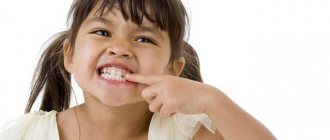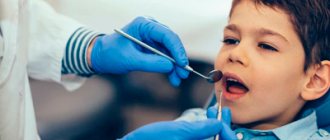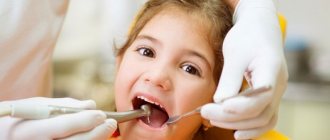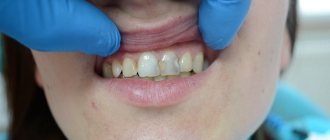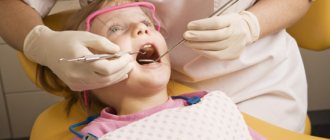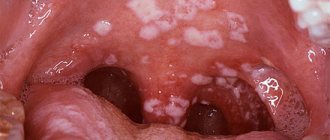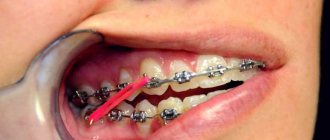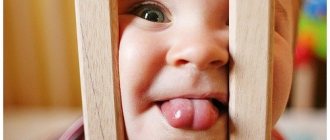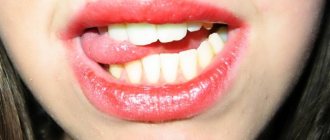Most dental diseases have no age restrictions and occur in both adults and children. One of the most common problems can rightfully be called bruxism or, in other words, teeth grinding. Involuntary clicking of teeth during sleep or wakefulness seems harmless and harmless to us, but is it really so?
Dentists note that childhood bruxism occurs in almost every 2-3 patients. If your baby only occasionally grinds his teeth during sleep (usually about 10 seconds), there is no need to worry. But if a similar phenomenon occurs every night, and the child complains of a headache or toothache, looks tired and depressed, this is already a reason to consult a doctor.
General description of the phenomenon
Half of children under 5 years of age involuntarily grind their teeth due to a spasm of the chewing muscles. Teeth grinding occurs involuntarily, occurs in paroxysms, lasts 1-2 minutes, and then repeats. The characteristic sound of teeth rubbing against each other can be heard from the nursery several times a night.
Attacks do not depend on the time of day and can occur during periods of rest and wakefulness. The child grinds his teeth day and night, but daytime grinding bothers adults more than nighttime grinding. Daytime grinding attacks are called bruxomania. Parents turn to the pediatrician when an episodic phenomenon develops into a chronic disorder.
Bruxism in children can be caused by dental, neurological and psychological reasons. In order for a child to stop grinding his teeth, the causes must be eliminated. Installing them is not so easy: you will need to undergo examination by a dentist, neurologist, endocrinologist and psychologist.
Teeth grinding is more common in young children. After 6-7 years it ceases to be a problem and disappears on its own. Bruxism is a rare phenomenon in adolescence and older age, which is diagnosed in only 10-15% of patients.
It is impossible to ignore teeth grinding in a child - it negatively affects the teeth, jaw and joints . Because of it, children:
- tooth enamel wears off;
- teeth become loose;
- the bite is disturbed;
- teeth become sensitive to hot, cold, sour and bitter foods;
- the temporomandibular joint is overloaded;
- spasms of the masticatory muscles occur;
- involuntary spasms of the facial muscles occur, distorting the contour of the face.
Malocclusion leads to wear and then loss of teeth in youth, dislocation of the temporomandibular joint and facial asymmetry.
Teeth grinding is not considered a separate disease. This is a symptom caused by a disorder in the development of the dental system, parasitic diseases, and nervous strain. When making a diagnosis, the doctor assesses the general state of health, taking into account systemic, neurological and somatic symptoms.
Having heard the characteristic sound of grinding, parents need to carefully monitor the child and notice anything new in his behavior. In parallel with bruxism, other symptoms appear, which will make it easier to determine its causes. Tell your pediatrician if your baby has any complaints about your health that indicate fatigue or the development of a disease in the digestive, endocrine, or nervous systems.
Prevention measures
Of course, when a child grinds his teeth, parents are interested in whether it is possible to somehow prevent the development of the disease? Unfortunately, today there is no specific prevention of bruxism. But if you follow simple rules, it is quite possible to minimize the risk of its occurrence.
- Pay attention to hygiene
The banal advice is not without common sense. Judge for yourself: a common cause of bruxism is a defensive reaction to the eruption of a new tooth. During the process, the gums become inflamed and mild itching may occur. It is advisable to give your child special teethers made of safe materials so that he does not rub his teeth against each other. Also, do not ignore brushing your teeth with special fingertips.
- No stress!
Do you want your child to avoid grinding his teeth all night long and then all day long? Eliminate any nervous stress from his life. It is generally accepted that only what happens directly to him can have a negative impact on the baby’s psyche. In fact, your quarrel with your spouse or a loud conversation on the phone with a work colleague can negatively affect his mood.
- Fight bad habits
Today, any doctor will tell you that the causes of teeth grinding are both an incorrect bite and a fixed pathological reflex, for example, sucking a pacifier to calm down in a stressful situation. Therefore, it is worthwhile to gently but decisively fight childhood bad habits and promptly consult an orthodontist if necessary.
Why does my child grind his teeth at night?
In a dream, a child grinds his teeth for various reasons.
Nervous overstrain
If the cause is nervous tension, check for the following signs:
- rapid breathing;
- rapid pulse;
- active swallowing of saliva;
- smacking;
- slurping;
- talking out loud while sleeping.
All this indicates overexcitation during the day. Emotionally active children and vulnerable kids who take everything to heart are more susceptible to stress than others. The former cannot sit still and waste a lot of energy, while the latter are sensitive to every little thing, which is why they experience more stress than their peers. Causes for concern may be:
- adaptation to a new team;
- changing of the living place;
- tense parental relationships;
- unfavorable family environment.
Stress accumulates during the day, and if the baby restrains or suppresses emotions, then when he relaxes at night, he cannot control the body.
Find out how to help your child adapt smoothly to school or kindergarten.
Active children do not experience stress caused by external circumstances, but independently bring themselves to nervous overstrain.
Problems with teeth, bite
Night grinding can occur due to dental problems:
- teeth are positioned incorrectly;
- the upper row of teeth does not meet the lower one;
- the filling sticks out above the dentition line.
Enlarged adenoids
If a child grinds his teeth in his sleep and at the same time sniffles, breathes with difficulty through his nose or breathes with an open mouth, it is necessary to exclude enlarged adenoids. In this case, you will need to consult a pediatrician and otolaryngologist.
Other reasons – Dr. Komarovsky’s opinion on teeth grinding
Dr. Komarovsky gives various reasons for bruxism:
- sensitivity of the child's psyche. Children perceive current events differently than adults, experiencing excessive emotional stress. If a child grinds his teeth in his sleep, he shows that he experienced stress during the day;
- tooth growth. Children grind their jaws when teething and replacing baby teeth with molars;
- diseases of the temporomandibular joint and malocclusion. Pathology of the dental system disrupts sleep by grinding teeth;
- heredity. Studies confirm that 3-year-old children are 51.3% more likely to bruxism if one of their parents suffered from it;
- bad dream. Teeth grinding occurs if sleep is disturbed by nightmares, speaking out loud, or sleepwalking;
- breathing disorders. Adenoids, runny nose, and nasal congestion prevent the child from breathing normally. Breathing with your mouth slightly open can cause creaking;
- vitamin deficiency. Disturbances in the functioning of the nervous system and contractions of the facial muscles can be caused by a lack of B vitamins, magnesium, calcium and essential amino acids;
- there is no adequate load on the jaws. A child’s diet, which contains little solid food, does not help form the jaw apparatus.
Older people blame helminths for teeth grinding. Soviet-era grandmothers cite the presence of helminthic infestation as the main reason why a child grinds his teeth in his sleep. Both healthy children and children who have been diagnosed with worms grind their teeth. The connection between the parasitic disease - helminthiasis - and night grinding is not scientifically substantiated.
Take care of the health and safety of your child, even when you are not around! Find out how he is feeling in kindergarten or primary school, quickly contact if necessary and listen to what is happening around with the help of the #1 app for caring parents “Where are my children”.
Results
Now you know much more about bruxism in children, general symptoms, the dynamics of this phenomenon, the specifics of diagnosis and methods of effective treatment. Our article will be especially important for young parents who do not have much life experience, but have a great desire to learn something useful and new about children and the difficulties that they may have to face during their development. It would be a good idea to share the article with friends, colleagues and relatives who are interested in this issue. I hope the information was informative and useful!
Bruxomania - teeth grinding while awake
Young children under 3 years of age may grind their teeth during the day if they are teething. So, by squeezing and unclenching their jaws, they try to get rid of the unpleasant sensation in the gums.
Involuntary grinding can also occur due to the fact that the lower row of teeth protrudes more forward or the upper row of teeth hangs excessively over the lower one. If, when closing the jaw, gaps are visible between the teeth, the baby is grinding due to an incorrectly formed bite.
Correct bite is not the norm, but rather the exception. 10% of the adult population can boast of a beautiful smile, while for everyone else, problems with the dental system develop in childhood.
Children over 3 years of age who do not have bite problems suffer from bruxomania if they have an extremely excitable nervous system or a stressful environment.
What does childhood bruxism mean at different ages?
Teeth grinding may be a concomitant phenomenon associated with physiological changes in the body. Before running to the doctor, rule out age-related developmental features.
7-8 months
Grinding in infants may occur if they are weaned from breastfeeding or have had an emotionally charged day. At the same time, they begin to be capricious, cry, refuse to eat, disrupting their feeding and sleep patterns. To avoid a “scary” sound, the baby should be in the most comfortable environment possible. Weaning may be causing stress, so hold off on making feeding changes until later.
9-10 months
At this time, baby teeth begin to cut, which is why the baby’s gums swell, body temperature rises and behavior changes. The child cries more and puts all objects in his mouth. In this case, the grinding is a symptom that will go away after some time. To make your child feel better, give painkillers, anti-inflammatory medications, and use cooling gels for the gums.
11-12 months
Children grind their teeth after weaning and due to vitamin deficiency caused by a deficiency of micro- and macroelements in the new feeding. During this period, they sleep poorly and lose their appetite.
If in addition to this, the child experiences pale skin, convulsions and lethargy, you should immediately consult a doctor.
1-2 years
After the first year of life, babies suffer from nasal breathing problems and various inflammations of the nasopharynx. These children are diagnosed with:
- adenoids;
- labored breathing;
- cough;
- rhinitis;
- sinusitis.
This age requires increased attention to health: prevent colds, strengthen the immune system and promptly treat diseases under the supervision of an otolaryngologist.
3-4 years
Children begin to socialize and communicate with peers in kindergarten. Adaptation in a team is complicated by the 3-year crisis, which manifests itself in the form of whims, hysterics, disobedience and non-compliance with the daily routine.
5-6 years
The creaking sound appears more often during the day than at night. Bruxism affects preschoolers who have problems with their bite or nervous system. It is accompanied by spasms of the facial muscles, incorrect positioning of the teeth, and complaints of pain from various organs. To avoid grinding, consult your dentist, pediatrician, and, if necessary, other doctors. Treat dental anomalies: you need to wear mouthguards, plates or other removable structures that correct the bite.
Diagnostic methods
Since bruxism is considered a polyetiological disease, before starting its treatment it is important to conduct a comprehensive diagnosis. To begin with, a standard procedure is prescribed using brux checkers. These devices are mouthguards to be worn at night. After the patient wears them overnight, the impression is sent to the dentist for analysis. This way you can determine which teeth are experiencing overstrain, and how much the disease is related to the bite and location of a person’s teeth.
In order to diagnose pathologies of the masticatory muscles, electromyographic analysis is used. This research method will allow you to assess the condition of the muscles at rest and in motion. This way you can determine myofascial pain syndrome, and by the location and function of the muscles, you can identify incorrectly selected and installed prostheses. In children, the mechanism of development of the disease is often associated with the process of teething. Symptoms of bruxism will help parents identify and pay attention to their child’s malocclusion in the early stages.
You may need to consult a neurologist, otolaryngologist, psychotherapist, or maxillofacial surgeon. Based on the data of a comprehensive examination, a final diagnosis can be made and a suitable treatment regimen can be prescribed. The Clinical Brain Institute employs qualified specialists who have successful experience in treating bruxism in patients of all ages. There are also all conditions for examination using instrumental methods.
About the need to treat bruxism
If teeth grinding disrupts sleep for several days, then it’s too early to sound the alarm. However, if the grinding episode becomes persistent, it is time to see a doctor. Parents need to find out why their child grinds his teeth if:
- the grinding is strong and leads to pain in the jaw and neck;
- the child continues to grind his teeth for 3 weeks or more;
- poor health, complaints about sleep and pain from any organ system;
- other symptoms appear.
Procedure for making a diagnosis:
- make an appointment with your local doctor;
- talk about changes that were noticed in the behavior and health of the baby;
- get examined by a dentist;
- as prescribed by the treating pediatrician, do polysomnography, consult with a neurologist, gastroenterologist, or otolaryngologist.
If you don't go to the hospital, you are putting your baby's health at risk. Untreated bruxism will lead to:
- chipped tooth;
- enamel microcracks;
- tooth abrasion;
- periodontitis;
- malocclusion;
- changes in jaw structure;
- dysfunction of the facial joints;
- headaches;
- neuralgia;
- spasms of the facial muscles;
- disruption of sleep and wakefulness;
- diseases of the nasopharynx.
During exacerbations of bruxism, nightmares and sleep disturbances alone will not be enough. Throughout his life, the child will face serious consequences after “childish” teeth grinding.
How is bruxism treated?
The course of treatment is selected after it is determined exactly why the child grinds his teeth. Depending on the reason, they may prescribe:
- consultations with a psychologist teaching how to independently relieve nervous tension;
- a course of psychotherapy to stabilize the emotional state;
- drug treatment against cramps of the facial and masticatory muscles, damage to the trigeminal nerve;
- therapeutic and preventive procedures for improving the health of the oral cavity;
- anthelmintic drugs.
At the same time, the pediatrician will recommend not to overexert yourself before bed, stick to a routine, get a balanced diet, take a complex of vitamins for children, and attend physical therapy to normalize nasal breathing.
Causes.
The causes of bruxism are not fully understood. According to most researchers, bruxism more often occurs in people experiencing stress, psychological disorders that lead to internal anxiety, anger, tension, and an excited state before bedtime. In addition, the causes of bruxism can be sleep disorders, namely somnambulism, enuresis, nightmares, snoring and periods of respiratory arrest during sleep.
As a rule, the diagnosis is established on the basis of anamnesis. The patient may complain, in addition to teeth grinding, of muscle and joint pain in the lower jaw. The diagnosis can be confirmed using a polysomnographic study, which records the contraction of the masticatory muscles. Polysomnography is also important to exclude epilepsy as a causative factor of bruxism.
Tips for parents
To have a restful sleep, instead of watching cartoons, outdoor activities and computer games, take a walk down the street in the evening. Before going to bed, a child can take a relaxing bath and listen to a good fairy tale that does not contain scary characters.
Contact your dentist even if there are no problems with your teeth, but bruxism is present. He will select a special mouth guard for night wear. It does not eliminate grinding, but protects teeth from abrasion.
Half of children grind their teeth, so there is no need to panic at a single grinding sound. You should be concerned about frequent squeaks.
To prevent a child from grinding his teeth, the cause must be found and eradicated. Make sure he avoids stressful situations, eats right and doesn't overwork himself.
